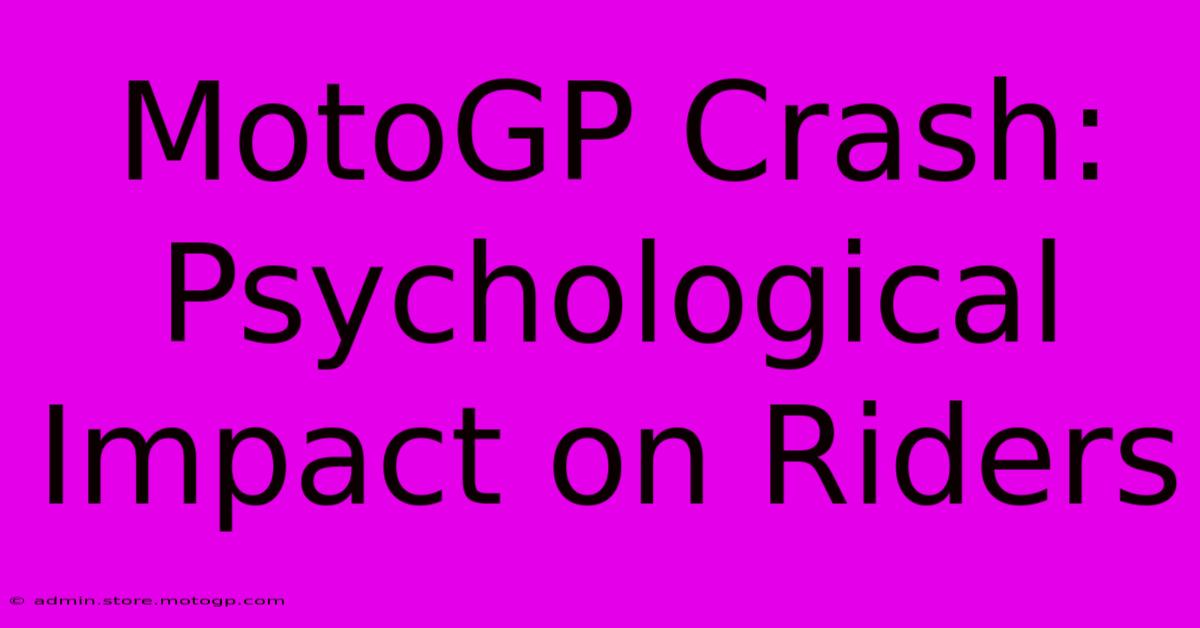MotoGP Crash: Psychological Impact On Riders

Table of Contents
MotoGP Crash: The Psychological Impact on Riders
The roar of the crowd, the smell of burning rubber, the adrenaline surge – MotoGP racing is a spectacle of speed, skill, and breathtaking risk. But behind the glory and the adrenaline lies a harsh reality: the ever-present threat of a crash. While the physical injuries are often immediately apparent and treated, the psychological impact of a MotoGP crash can be far-reaching and long-lasting, significantly affecting a rider's career and well-being.
The Immediate Aftermath: Shock and Trauma
A high-speed crash in MotoGP isn't just a tumble; it's a violent, unpredictable event that can leave riders with a range of immediate psychological reactions. Shock is common, followed by disorientation and fear. The sheer force of impact, the potential for serious injury, and the sudden loss of control can be deeply traumatizing. Even if physically unharmed, the emotional experience can be overwhelming. Many riders describe a feeling of vulnerability and helplessness in the moments following a crash.
Dealing with Pain and Injury
The physical pain associated with a crash, even minor injuries, exacerbates the psychological impact. Pain itself is a powerful stressor, and the anticipation of further pain during recovery can lead to anxiety and depression. The inability to ride, a fundamental part of a MotoGP rider's identity and livelihood, adds another layer of psychological distress. This enforced downtime can trigger feelings of loss of control, frustration, and identity crisis.
Long-Term Psychological Effects: Beyond the Bruises
The psychological effects of a MotoGP crash extend far beyond the immediate aftermath. Many riders struggle with Post-Traumatic Stress Disorder (PTSD), experiencing flashbacks, nightmares, and intense anxiety related to riding or even just watching races. The fear of a repeat crash, known as crash anxiety, can be debilitating, making it difficult to regain confidence and return to racing at the same level.
The Impact on Confidence and Performance
A significant crash can severely damage a rider's confidence. This is not simply a matter of self-esteem; it's about the fundamental trust required to push oneself to the limits on a motorcycle traveling at incredible speeds. Loss of confidence can translate directly into performance anxiety and a reluctance to take risks, hindering a rider's ability to compete effectively.
The Role of Mental Resilience and Support
While the psychological impact of a MotoGP crash can be substantial, mental resilience plays a crucial role in recovery. Riders who possess strong coping mechanisms, effective stress management techniques, and a robust support system often fare better. This support network includes sports psychologists, family, and fellow riders who understand the unique pressures of the sport. Professional guidance is essential in processing trauma, managing anxiety, and regaining confidence.
Returning to the Track: A Gradual Process
The return to racing after a significant crash is rarely straightforward. It requires a carefully managed and personalized approach, involving both physical and psychological rehabilitation. Riders may initially opt for gradual re-integration, starting with less demanding riding sessions and progressively increasing the intensity. This approach allows them to rebuild confidence and physical fitness without overwhelming the system. Cognitive Behavioral Therapy (CBT) is often used to help riders manage their anxiety and reframe their thoughts about risk and fear.
Conclusion: Prioritizing Mental Health in MotoGP
The high-stakes world of MotoGP demands exceptional physical and mental fortitude. While the physical aspects of recovery from a crash are well-addressed, the psychological impact often requires specialized attention. By acknowledging the significant mental health challenges faced by riders and prioritizing access to appropriate support, the sport can ensure the well-being of its athletes and foster a culture that values both physical and mental resilience. The future of MotoGP depends not only on speed and skill, but also on the mental health and well-being of its courageous competitors.

Thank you for visiting our website wich cover about MotoGP Crash: Psychological Impact On Riders. We hope the information provided has been useful to you. Feel free to contact us if you have any questions or need further assistance. See you next time and dont miss to bookmark.
Featured Posts
-
Moto3 Bikes Ride Like A Champion
Feb 18, 2025
-
Moto Gps Biggest Crashes What Went Wrong
Feb 18, 2025
-
Dominating The Track Moto Gps Elite Riders
Feb 18, 2025
-
The Secrets Of Moto Gp Commentary Revealed
Feb 18, 2025
-
Moto Gps Greatest Comebacks Stories Of Resilience And Triumph
Feb 18, 2025
